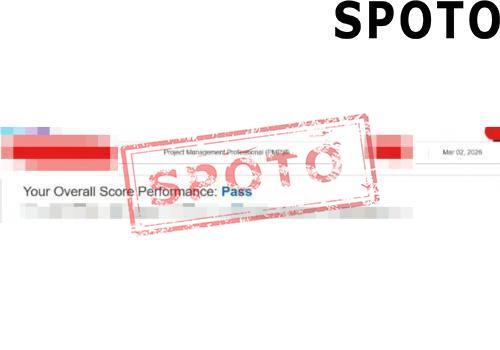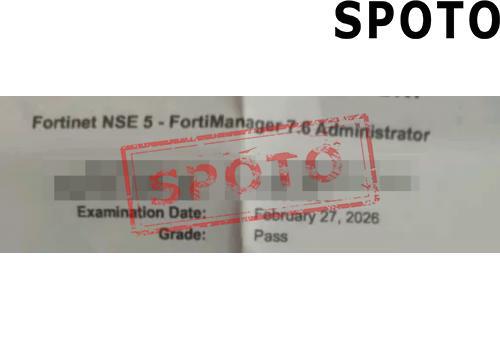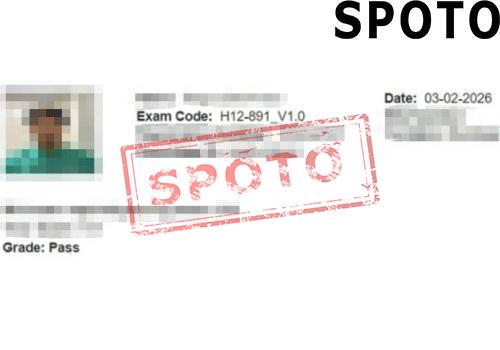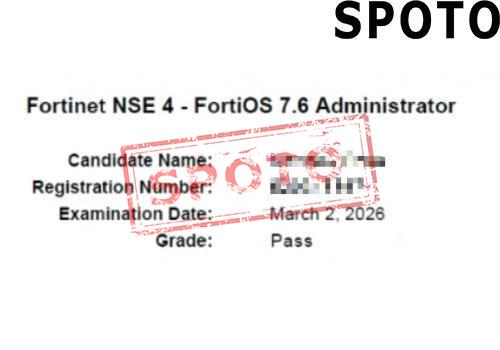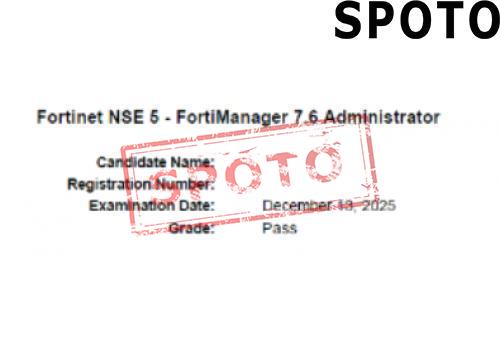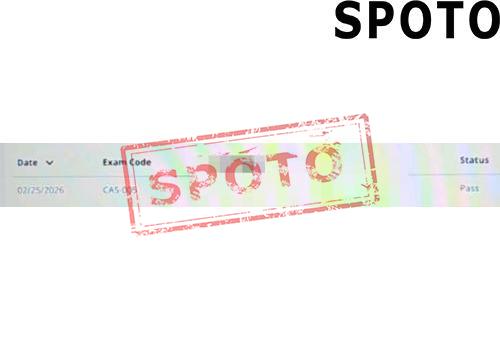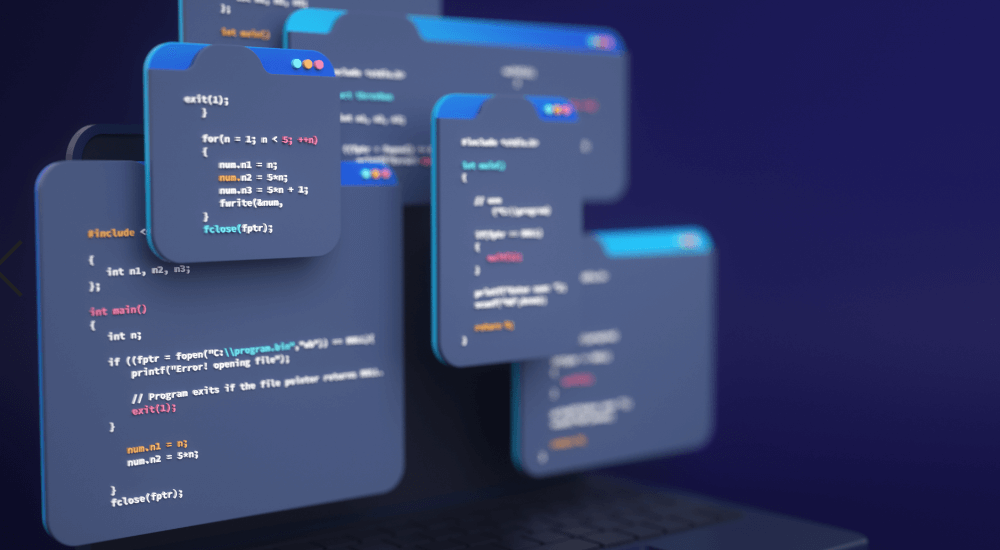
Fortinet certifications are among the most valuable credentials for IT professionals aiming to specialize in network security. With the growing adoption of Fortinet's solutions, particularly FortiGate firewalls, SD-WAN, and cloud security, there is a rising demand for professionals with Fortinet certifications. Whether you're pursuing the foundational Fortinet Certified Fundamentals (FCF) or the expert-level Fortinet Certified Expert (FCX), the journey to certification requires a structured approach and solid preparation.
This guide outlines key strategies to help you succeed in your Fortinet certification exams, regardless of your target level.
1. Understand the Certification Levels and Exam Structure
Before diving into study materials, it's crucial to understand the Fortinet certification structure. Fortinet offers five main certification levels, each designed to assess your expertise at different stages of your career:
- Fortinet Certified Expert (FCX): This is the pinnacle of Fortinet knowledge, validating mastery of advanced security concepts and solutions.
- Fortinet Certified Solution Specialist (FCSS) — Engineer: This level is for those who specialize in deploying and managing complex Fortinet solutions in areas like SD-WAN or cloud security.
- Fortinet Certified Professional (FCP): Aimed at those who want to deepen their expertise in specific areas like firewalling or secure access.
- Fortinet Certified Associate (FCA): This level provides practical skills in deploying and managing basic Fortinet security solutions.
- Fortinet Certified Fundamentals (FCF): This entry-level certification lays the foundation for understanding Fortinet solutions and is ideal for beginners.
Choosing the right certification path is essential. Understand which level suits your current knowledge and career goals, and start with the fundamentals if you're new to Fortinet products.
2. Leverage Fortinet's Official Training Resources
Fortinet offers official resources that are aligned with their certification exams. These resources are designed to help you gain in-depth knowledge of Fortinet's solutions, configurations, and troubleshooting practices.
Here's where to start:
- Fortinet's NSE Training Institute: This platform offers free and paid courses, e-learning modules, and instructor-led training sessions. It covers all certification levels, from Fundamentals to Expert.
- FortiGate Configuration Guides: As most Fortinet certifications test knowledge on FortiGate firewalls, dive into the official configuration and user guides. The FortiOS Handbook is an excellent resource for NSE 4 and higher levels.
Focus on mastering configuration, monitoring, and troubleshooting Fortinet devices in line with your certification path.
3. Set Up a Hands-On Lab Environment
Practical experience is crucial for Fortinet exams, especially those at the Professional and Expert levels. Setting up a home lab or using virtual labs is key to practicing configurations and troubleshooting tasks.
Ways to create a lab environment:
- Virtual Appliances (VMs): Fortinet or platforms like SPOTO offer Virtual Appliances for use in virtual environments like VMware or VirtualBox. This allows you to simulate real-world configurations.
- Fortinet Developer Network (FNDN): Gain access to FortiGate Cloud and other services for learning and practice.
- Physical Equipment: If possible, work with real FortiGate hardware to experience the practical application of your skills.
Hands-on labs will help you gain confidence in configuring and securing Fortinet devices, which is essential for passing the practical portions of the exams.
4. Familiarize Yourself with the Exam Objectives
Fortinet's exams cover specific objectives that you need to understand thoroughly. Each certification level has a blueprint or syllabus, detailing what will be covered in the exam. These objectives provide a clear roadmap for your studies.
For example, if you're preparing for NSE 4 (Fortinet Certified Professional), some of the key topics include:
- Firewall Policy Configuration
- VPN Setup and Troubleshooting
- High Availability (HA) Configuration
- Advanced Routing
- Security Profiles (IPS, antivirus, web filtering)
Break down your study sessions according to the exam objectives to ensure you're covering everything you need to know.
5. Practice with Real-World Scenarios
Fortinet exams are highly practical, especially for NSE 4 and above. These exams often involve scenarios where you need to configure and troubleshoot FortiGate firewalls under time pressure. To prepare, simulate real-world scenarios and practice solving problems as you would in the exam.
- Configure VPNs, firewall policies, and high availability (HA).
- Troubleshoot network issues like latency, traffic routing, and security breaches.
- Master both CLI (Command Line Interface) and GUI configuration techniques.
Incorporate as much hands-on practice as possible to ensure you're well-prepared for real exam conditions.
6. Join the Fortinet Community
Fortinet has an active community where you can engage with other professionals, ask questions, and find helpful resources. Being part of these forums can provide insights into difficult topics, exam strategies, and potential issues others have encountered during their certification journey.
- Fortinet Community Forum: Participate in discussions, exchange tips, and solve problems with others in the community.
- Reddit and LinkedIn: Join dedicated groups focused on Fortinet certifications and stay updated on the latest exam trends and best practices.
Collaborating with others in the community helps expand your knowledge and gives you the support you need throughout your study process.
7. Focus on Key Topics Based on Exam Level
Different certification levels will emphasize different topics. Here's a brief breakdown of the key areas for each level:
- FCF & FCA (Entry-level): Focus on basic concepts like firewall policies, NAT, and basic security configurations. Understand FortiGate basics and how to deploy simple solutions.
- FCP (Professional): Dive deeper into VPN configurations, advanced routing (OSPF, BGP), user authentication, and troubleshooting.
- FCSS (Solution Specialist): Master the deployment and management of complex Fortinet solutions like SD-WAN, cloud security, and FortiManager.
- FCX (Expert): Focus on advanced troubleshooting, large-scale deployments, and security protocols like IPSec, SSL VPN, and FortiSIEM.
Focusing on the most tested and relevant topics for your certification level ensures a targeted and efficient study plan.
8. Take Practice Exams and Simulations
Taking practice exams and using simulation software can help you assess your readiness and understand the exam format. Many third-party providers offer practice exams that mirror the actual test environment.
Why practice exams matter:
- Simulate real test conditions to get comfortable with the format and time constraints.
- Identify knowledge gaps and areas that need further review.
- Build confidence by practicing exam-like questions and scenarios.
9. Review Documentation Thoroughly
During the exam, you may be allowed to refer to Fortinet's official documentation. Familiarize yourself with the format of these documents so you can quickly locate relevant information during the exam.
Essential documentation to review:
- FortiOS Handbook: A comprehensive guide for configuring and managing FortiGate firewalls.
- CLI Reference: Essential for command-line configuration during the practical exam.
- Product Datasheets: Review documentation for FortiGate, FortiManager, and other Fortinet products to understand their advanced capabilities.
10. Stay Consistent and Take Care of Yourself
Consistency is key when studying for Fortinet exams. Establish a study schedule and stick to it. Ensure you're giving yourself ample time to review, practice, and rest.
Additionally:
- Take regular breaks to avoid burnout.
- Get enough sleep before the exam day.
- Stay hydrated and energized during study sessions.
Conclusion
Preparing for a Fortinet certification exam requires a strategic approach, starting with a solid understanding of the certification levels and exam objectives. By utilizing official Fortinet resources, setting up hands-on labs, practicing with real-world scenarios, and engaging with the Fortinet community, you can increase your chances of success. Whether you're aiming for the Fortinet Certified Fundamentals (FCF) or the expert-level Fortinet Certified Expert (FCX), consistent preparation will ensure you're ready to ace your exam with confidence.
